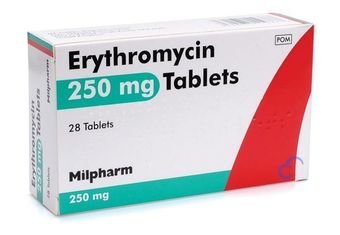Medication features
Erythromycin 250mg tablets are an effective antibiotic that is used to kill bacteria that live on the skin and cause symptoms such as redness and blemishes in rosacea. Within a couple of months, the skin is left visibly clearer and less irritated.
Overview
What Is Erythromycin?
Erythromycin is an antibiotic that is used to kill bacteria that causes skin conditions such as rosacea. The treatment – which is also sold under the brand names Erythrocin, Erythroped and Erymax – belongs to the macrolide antibiotic class of medications.
You can find erythromycin in 100 mg, 250 mg and 500 mg tablets. Erythromycin contains the active ingredient erythromycin, as well as inactive ingredients such as croscarmellose sodium and crospovidone.
Erythromycin for Rosacea
Erythromycin is used to treat a range of infections, including:
- Skin infections
- Chest infections
- Ear infections
- Respiratory tract infections
- Pelvic inflammatory disease
The antibiotic is considered an effective treatment for rosacea (a common skin condition that causes the blood vessels in your face to become more visible) leading to symptoms such as blushing, flushing, and small bumps. Erythromycin can kill bacteria that live on the skin and result in redness. It can clear the skin while reducing irritation.
How Does Erythromycin Work?
Erythromycin is a macrolide antibiotic which treats bacterial infections. It functions by preventing the growth of bacteria. Macrolide antibiotics can inhibit protein synthesis by targeting the bacterial ribosome (which synthesises cellular proteins).
It should be noted that erythromycin only treats or prevents bacterial infections, and is not effective in treating viral infections such as colds or flu.
Erythromycin and Alcohol
You should stop, or at least limit, your alcohol intake when taking erythromycin. That’s because alcohol may interfere with the medicine; slowing it down or delaying it from working.
Erythromycin in Pregnancy
You can normally take erythromycin during pregnancy. It can be prescribed in the case of waters breaking early, to reduce the chances of going into labour early and the risk of infection. Depending on the type of infection you have, other antibiotics could be more suitable for you in the first 12 weeks of pregnancy. Erythromycin will only be prescribed to you while pregnant if a doctor decides its benefits outweigh any possible risks.
Provided your baby is healthy, you can take erythromycin while you are breastfeeding. There have been reports of some babies having mild stomach upsets or becoming drowsy as a result of consuming breast milk while the mother is taking erythromycin. But despite Erythromycin passing into the breast milk, the amounts are so small that it is unlikely to affect your baby. You should contact a doctor or medical professional if your baby:
- Has a rash
- Is not feeding well
- Seems unsettled after feeding
- Is unusually sleepy
- Has a bad stomach
- Develops a fungal infection in the mouth such as oral thrush
Erythromycin vs Azithromycin
Erythromycin and azithromycin are both in the macrolides class of antibiotics, which are characterised by their large molecular size. Azithromycin is also sold under the brand name Zithromax in the UK. Like erythromycin, it treats bacterial infections, including skin conditions.
The two medications share an identical lactose-macrolide structure, with azithromycin being derived from erythromycin. They work in the same way; by binding to the bacterial ribosome and disrupting protein synthesis, which prevents the growth of bacteria.
Both of these medications are only available on prescription in the UK, and cannot be bought over the counter. They are taken orally, and both come in 250 mg and 500 mg tablets. The standard adult dosage of azithromycin for rosacea differs from that of erythromycin. While the normal erythromycin dosage is 250 mg to 1,000 mg, taken four times per day, the azithromycin dosage is 500 mg, taken once per day.
A significant difference in the make-up of erythromycin and azithromycin is the injection of methylated nitrogen in the lactone ring that erythromycin features. This alters the bacterial coverage slightly, as well as the route of metabolism. Erythromycin and azithromycin are similarly effective in fighting various types of bacteria, although azithromycin was found to be more effective in fighting Haemophilus influenza. Erythromycin is understood to have a higher number of major drug interactions than azithromycin.
Erythromycin Reviews
Many reviewers online have commented that erythromycin was effective in clearing up their rosacea. Some people have reported that erythromycin was the first treatment that worked after they had tried other antibiotics, as well as creams. Users have said that they began to notice their skin improving within a few days to a week of starting to take erythromycin. However, some reviewers explained that for skin conditions such as acne, it took several weeks before they saw significant improvement in their skin.
Can You Buy Erythromycin Over the Counter?
Erythromycin is not available over the counter in the UK. A medical professional will need to issue you with a prescription for erythromycin tablets after assessing your suitability for the medication. You can then buy erythromycin from your online or local pharmacy.
Why not give yourself the convenience of Cloud Pharmacy’s online service? You’ll be able to purchase erythromycin online after one of our online pharmacists has provided a short consultation. Once your suitability for the medication has been confirmed, and your prescription has been issued, we will dispense your tablets and send them to you promptly via our next-day delivery service.
Directions
Erythromycin Interactions
A research paper that covers Erythromycin: drug interactions list the following medicines that erythromycin may interact with: Theophylline, carbamazepine, cyclosporin, tacrolimus, warfarin, digoxin, terfenadine, astemizole, cisapride, lovastatin, triazolam, and disopyramide.
There are other medicines which may not mix well when taken with erythromycin. Tell your doctor if you are taking any of the following:
- Domperidone, the anti-sickness medicine
- Medicines for mental health problems
- Simvastatin
- Anticoagulants to prevent blood clots
You should also inform your doctor or pharmacist if you are taking herbal remedies, supplements or vitamins.
Erythromycin Dosage
The normal adult dose of erythromycin is 250 mg to 1,000 mg, taken 4 times per day. In some cases, it may be taken twice per day. The dosage will vary according to the type of skin condition you have, and its severity. The dose may be lower for children.
How Long for Erythromycin to Work?
While some bacterial skin infections can be cleared up by erythromycin in a few days, it would usually take eight weeks or more for skin problems such as rosacea and acne to show a significant improvement.
You must continue to take erythromycin until your course is finished, even if you start to feel better. Finishing your course helps to prevent the infection from returning. Your doctor will tell you how long you need to continue taking erythromycin tablets.
How to Take Erythromycin
You should swallow erythromycin tablets whole with water. Never crush, break or chew them. If you have trouble swallowing erythromycin tablets, your doctor may recommend liquid erythromycin. It is better to take erythromycin tablets with food, as this can help to avoid an upset stomach.
Space your erythromycin doses as evenly as possible throughout the day. If you are taking four doses per day, you could have one when you wake up, at midday, in the late afternoon, and before bed.
If you forget to take a dose, take it once you remember. If you don’t remember until it is nearly time for your next dose, simply take the next dose at the normal time. Don’t take two doses to make up for the missed dose.
Side Effects
Erythromycin Side Effects
Not everyone will experience side effects from erythromycin. However, there are some common potential side effects that will occur in more than one in 100 people. These include:
- Nausea
- Sickness
- Stomach cramps
- Diarrhoea
- Bloating
- Indigestion
- Loss of appetite
Serious side effects from erythromycin are rare, occurring in less than one in 1,000 people. If you experience any of the following side effects, you should contact a medical professional or call 999:
- Severe stomach pain
- Skin rash
- Hallucinations
- Fever
- Hearing loss or ringing in the ears
- Loss of balance
- Signs of liver problems such as yellowing of the eyes or skin, pale stools and dark pee
- Chest pain
- Abnormal heart pain
- Signs of an allergic reaction such as wheezing, a sudden skin rash, breathing difficulty, tightness in the chest, tightness in the throat, having trouble talking, and swelling around the face or inside the mouth
Patient Information Leaflet
Erythromycin Tablets Patient Information Leaflet
For more information on Erythromycin tablets, take a look at the Patient Information Leaflet below:
Erythromycin 250mg Tablets Reviews
Confirm Erythromycin 250mg Tablets treatment selection
| 250mg | 168 (6 weeks) | £32.99 |
| 250mg | 336 (12 weeks) | £65.98 |
















